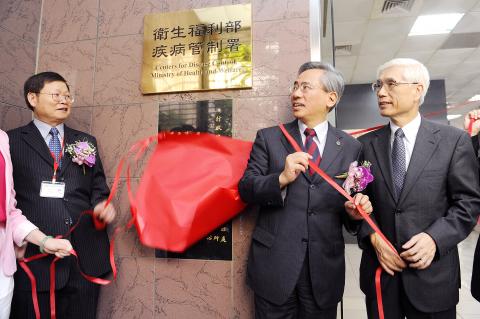The official restructuring of the Department of Health as the Ministry of Health and Welfare was completed yesterday, with the integration of resources and the establishment of the Social and Family Affairs Administration and the Department of Social Insurance being the major changes made, the ministry said.
The Bureau of National Health Insurance has become the National Health Insurance Administration (NHIA) and the Bureau of Health Promotion is now the Health Promotion Administration.
The Centers for Disease Control and the Food and Drug Administration will keep the names, but are now a notch higher in the bureaucratic hierarchy.

Photo: George Tsorng, Taipei Times
Other notable changes are the incorporation of the Social and Family Affairs Administration and the Department of Social Insurance.
The former has integrated the bodies that are in charge of the welfare of women, senior citizens and people with disabilities that were previously under the Ministry of Interior’s Department of Social Affairs, as well as the Child Welfare Bureau, which was also previously under the interior ministry.
The goal of the administration is the implementation of a family and community-centered total care system, the agency said.
The social insurance department, on the other hand, has been restructured to have a better and more comprehensive grip on the three major social insurances, the NHI, the national pension and long-term care insurance.
The integration of resources made possible by the restructuring, among other tasks, is “to break the cycle of poverty-made illness and illness-made poverty and to provide better care for elderly people in an aging society,” the ministry said.
That is to be achieved by strengthening social insurance, developing a long-term care system, building healthcare and welfare clouds for comprehensive care, upgrading medical services in rural areas and connecting the public health and social resources provided at the central level and those at the local level to build an all-encompassing social security network, the ministry said.

Taiwan is to commence mass production of the Tien Kung (天弓, “Sky Bow”) III, IV and V missiles by the second quarter of this year if the legislature approves the government’s NT$1.25 trillion (US$39.78 billion) special defense budget, an official said yesterday. Commenting on condition of anonymity, a defense official with knowledge of the matter said that the advanced systems are expected to provide crucial capabilities against ballistic and cruise missiles for the proposed “T-Dome,” an advanced, multi-layered air defense network. The Tien Kung III is an air defense missile with a maximum interception altitude of 35km. The Tien Kung IV and V

The disruption of 941 flights in and out of Taiwan due to China’s large-scale military exercises was no accident, but rather the result of a “quasi-blockade” used to simulate creating the air and sea routes needed for an amphibious landing, a military expert said. The disruptions occurred on Tuesday and lasted about 10 hours as China conducted live-fire drills in the Taiwan Strait. The Civil Aviation Administration (CAA) said the exercises affected 857 international flights and 84 domestic flights, affecting more than 100,000 travelers. Su Tzu-yun (蘇紫雲), a research fellow at the government-sponsored Institute for National Defense and Security Research, said the air

A strong continental cold air mass is to bring pollutants to Taiwan from tomorrow, the Ministry of Environment said today, as it issued an “orange” air quality alert for most of the country. All of Taiwan except for Hualien and Taitung counties is to be under an “orange” air quality alert tomorrow, indicating air quality that is unhealthy for sensitive groups. In China, areas from Shandong to Shanghai have been enveloped in haze since Saturday, the ministry said in a news release. Yesterday, hourly concentrations of PM2.5 in these areas ranged from 65 to 160 micrograms per cubic meter (mg/m³), and pollutants were

Taiwan’s armed forces have established response protocols for a wide range of sudden contingencies, including the “Wan Chun Plan” to protect the head of state, the Ministry of Defense (MND) said today. After US President Donald Trump on Saturday launched a series of airstrikes in Venezuela and kidnapped Venezuelan President Nicolas Maduro, concerns have been raised as to whether China would launch a similar “decapitation strike” on Taiwan. The armed forces regularly coordinate with relevant agencies and practice drills to ensure preparedness for a wide range of scenarios, Vice Minister of National Defense Hsu Szu-chien (徐斯儉) told reporters before a